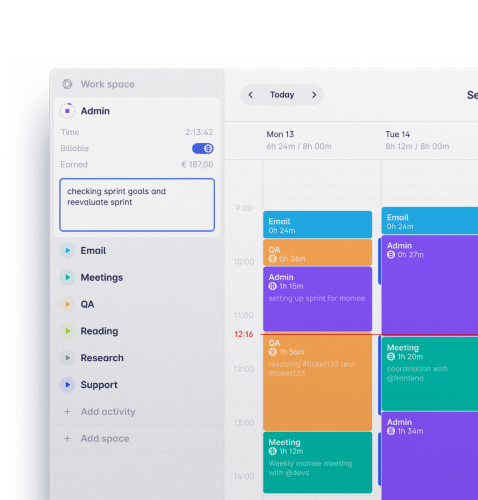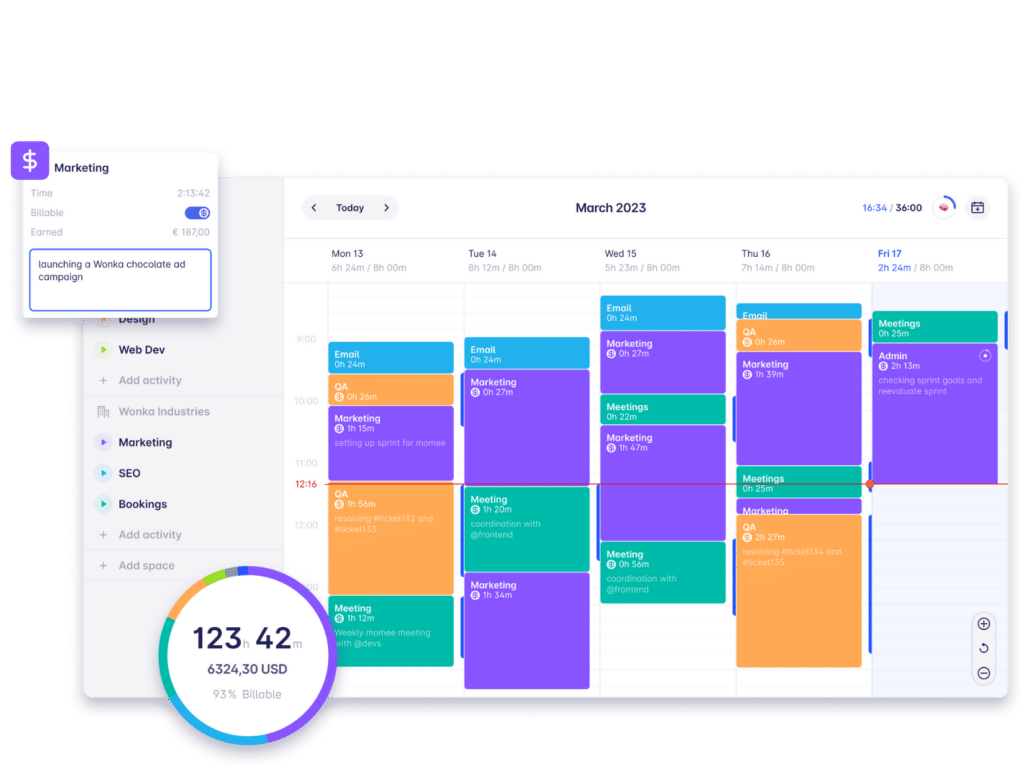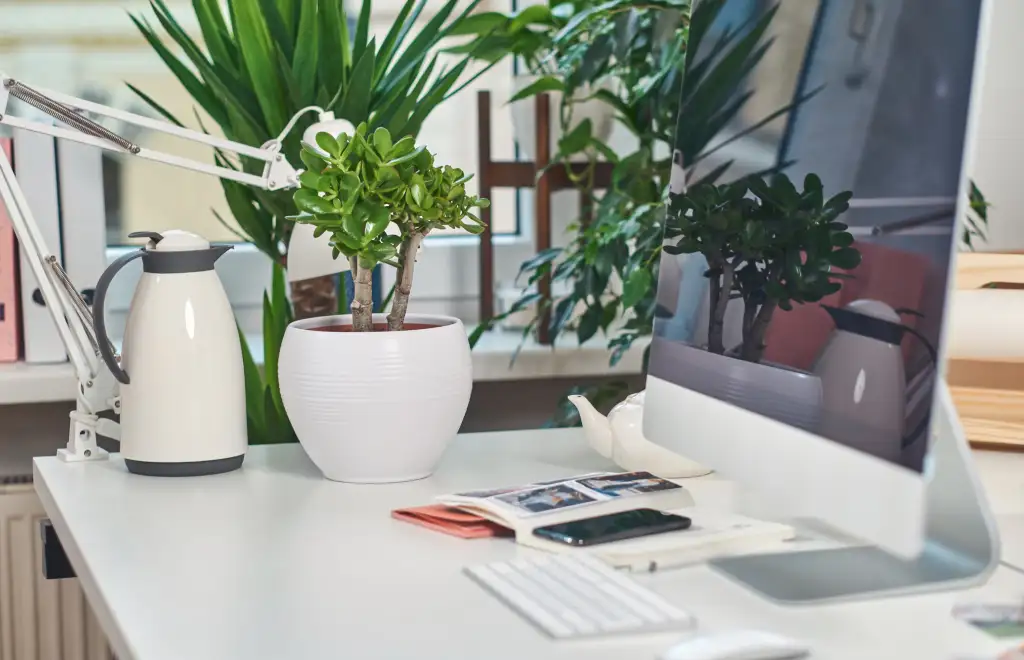Wie man Fokus und Konzentration verbessert: Der ultimative Leitfaden
Wir leben in einer sehr schnelllebigen Welt, in der es überall Ablenkungen gibt. Es wird immer schwieriger, den Fokus und die Konzentration auf die wichtigen Dinge zu behalten. Bei dem ständigen Bombardement an Benachrichtigungen, E-Mails und Social-Media-Updates ist es kein Wunder, dass viele Menschen Schwierigkeiten haben, den Überblick zu behalten.

Die Fähigkeit, sich auf eine bestimmte Aufgabe zu konzentrieren, bis sie vollständig abgeschlossen ist, ist jedoch einer der wichtigsten Indikatoren für künftigen Erfolg, sowohl persönlich als auch beruflich.
In diesem Artikel geht es um Tipps und Möglichkeiten, wie du deinen Fokus und deine Konzentration verbessern kannst. Danach werden wir kurz die wichtigsten Vorteile einer Verbesserung erläutern.
Wie du deinen Fokus und deine Konzentration verbessern kannst: 15 wirksame Methoden
1. Ziele setzen und Aufgaben nach Prioritäten ordnen
Ziele zu setzen und Prioritäten zu setzen ist eine der besten Methoden, um die Konzentration zu verbessern. Diese Fähigkeit kann dein Leben auf sehr positive Weise nachhaltig beeinflussen.
Indem du dir Ziele setzt, gibst du deinem Handeln eine klare Richtung und einen Zweck und ermöglichst es dir, motiviert zu bleiben und dich auf das Wesentliche zu konzentrieren.
Wenn du hingegen deine Tagesaufgaben und Aktivitäten nach Prioritäten ordnest, stelle sicher, dass du Zeit und Energie für die wichtigsten Punkte auf deiner Aufgabenliste aufwenden.
Dadurch fühlst du dich weniger überwältigt und gestresst und das Risiko der Prokrastination wird verringert.
Setze dir also spezifische und messbare Ziele für jeden Tag, jede Woche und jeden Monat. Teile diese in kleinere, überschaubare Aufgaben auf und ordne sie nach ihrer Wichtigkeit und Dringlichkeit.
Auf diese Weise hast du eine klarere Vorstellung von dem, was zu tun ist, und vermeidest Aufschieberitis.

2. Zeit erfassen
Die Zeiterfassung ist eine der wirkungsvollsten Methoden zur Verbesserung von Konzentration und Produktivität.
Wir wollen sehen, wie die Zeiterfassung den Fokus und die Konzentration steigert:
- Gesteigertes Bewusstsein: Wenn du deine Zeit erfasst, wird dir bewusster, wie du sie verbringst. Dieses Bewusstsein kann dir helfen, Ablenkungen und zeitraubende Aktivitäten zu erkennen, und du kannst Anpassungen vornehmen, um deine Zeit und Aufmerksamkeit besser auf deine Prioritäten zu konzentrieren.
- Verantwortlichkeit: Die Zeiterfassung kann ein Gefühl von Verantwortung schaffen, das dich motiviert, fokussiert zu bleiben und Ablenkungen zu vermeiden. Wenn du weißt, dass du überwacht wirst, ist die Wahrscheinlichkeit geringer, dass du dich mit Aktivitäten beschäftigst, die nicht mit deinen Zielen in Zusammenhang stehen.
- Zielsetzung: Die Zeiterfassung kann dir helfen, konkrete Ziele zu setzen und zu erreichen. Du kannst deine Fortschritte verfolgen und deinen Erfolg im Laufe der Zeit messen, indem du deine Arbeit in kleinere, überschaubare Aufgaben unterteilst. Dies kann dir helfen, dich auf deine Arbeitsziele zu konzentrieren und Fortschritte zu machen.
- Zeitbewusstsein: Die Zeiterfassung kann dir helfen, besser zu verstehen, wie lange Aufgaben dauern und wie viel Zeit du für ihre Erledigung zur Verfügung hast. Dies kann dir helfen, Prioritäten bei deiner Arbeit zu setzen und deine Zeit besser zu nutzen.
Die Zeiterfassung kann den Fokus und die Konzentration erhöhen, indem sie das Bewusstsein schärft, Verantwortlichkeit schafft, die Zielsetzung erleichtert und die Zeitmanagementfähigkeiten verbessert.
Wir empfehlen dir dringend, eine Zeiterfassungssoftware mit den richtigen Funktionen für deine tägliche Routine zu verwenden, um mit der Erfassung deiner Zeit zu beginnen.

3. Zeitmanagementtechniken anwenden
Zeitmanagement-Methoden können dir helfen, deine Konzentration zu steigern und aufrechtzuerhalten, denn sie helfen dir bei:
- Prioritäten setzen: Zeitmanagementtechniken können dir helfen, Prioritäten für deine Aufgaben und Aktivitäten zu setzen. Wenn du dich auf die wichtigsten und dringendsten Aufgaben konzentrierst, kannst du Ablenkungen reduzieren und sicherstellen, dass du deine Zeit effektiv nutzt.
- Beseitigung von Zeitfressern: Zeitmanagementmethoden helfen dir, zeitraubende Aktivitäten und Ablenkungen zu beseitigen. Du kannst deine Konzentration und Produktivität verbessern, indem du Unterbrechungen minimierst, z. B. durch das Abrufen von sozialen Medien oder E-Mails.
- Weniger Stress: Ein effektives Zeitmanagement kann Stress und Zeitangst reduzieren, was dir helfen kann, fokussiert und konzentriert zu bleiben. Ein klarer Plan für deinen Tag kann das Gefühl der Überforderung verringern und deine Fähigkeit verbessern, dich auf die anstehende Aufgabe zu konzentrieren.
Dies sind die wichtigsten Vorteile des Zeitmanagements für deine Konzentration und deinen Fokus. Wir empfehlen dir, die folgenden Zeitmanagement-Methoden auszuprobieren, um optimale Ergebnisse zu erzielen: die Pomodoro-Technik, Zeitblockierung, Zeitkartierung und Eat the frog.
Ein Extra für dich:
4. Kein Multitasking
Vermeide Multitasking und das Wechseln zwischen verschiedenen Kontexten so weit wie möglich. Multitasking ist einer der größten Feinde von Produktivität und effektivem Zeitmanagement und eine der Hauptursachen für Arbeitsüberlastung.
Heutzutage betreiben die meisten von uns unbewusst Multitasking, während sie ihre Smartphones benutzen. Wir spielen Spiele, checken unsere E-Mails, gehen durch soziale Medien, schreiben SMS und nutzen viele Apps, während wir fernsehen, essen, arbeiten oder sogar mit jemandem sprechen.
Multitasking ist ein fester Bestandteil unseres Lebens geworden; die meisten tun es, ohne es zu merken. Durch Multitasking verwässerst du deinen Fokus und deine Aufmerksamkeit. Selbst wenn du an etwas relativ Einfachem arbeitest, dauert es viel länger, bis du fertig bist.
Es ist ein weit verbreiteter Irrglaube, dass man durch die gleichzeitige Erledigung mehrerer Dinge in kürzerer Zeit mehr erreichen kann - das Gegenteil ist der Fall. Ständiges Multitasking kann zu Gedächtnisproblemen und zu erhöhter Ablenkbarkeit führen.
5. Benachrichtigungen ausschalten
Eine klassische Methode zur Verbesserung von Fokus und Konzentration: das Ausschalten von Benachrichtigungen.
Ja, es umfasst sowohl private als auch berufliche Benachrichtigungen: Slack, E-Mail, Microsoft Teams und andere Apps, die dich stören können.
Wir werden ständig mit endlosen Benachrichtigungen auf unseren Telefonen, E-Mails, sozialen Medien usw. bombardiert, was unsere allgemeine Aufmerksamkeit erheblich beeinträchtigt.
Diese Art von Ablenkung verringert unsere Produktivität und Effizienz und kann zu unnötigen Fehlern und Irrtümern führen, die die Qualität unserer Arbeit beeinträchtigen.
Setze dein Telefon auf den „Nicht stören“-Modus, und du wirst sehen, wie dein Telefon sofort aufhört zu vibrieren. Wenn du aus irgendeinem Grund besorgt über Notfälle bist, kannst du dein Telefon so programmieren, dass wichtige Anrufe und Textnachrichten von bestimmten Kontakten durchkommen.
Du kannst auch deine Lieblings-Apps von dem Startbildschirm deines Handys verstecken. Wenn du sie nicht siehst, bist du weniger versucht, sie zu nutzen.
Versuche außerdem, deinen Bildschirm auf Graustufen umzuschalten. Bunte Benachrichtigungen und helle Icons ziehen immer leichter deine Aufmerksamkeit auf sich. Ein Schwarz-Weiß-Bildschirm mindert ihre Anziehungskraft.
Und schließlich solltest du die Technologie nutzen, um dir selbst zu helfen, und nicht das Gegenteil. Der Einsatz von Software zur Förderung von Fokus und Konzentration ist zum Beispiel einer der besten Tipps, um dich bei dieser Aufgabe zu unterstützen.

6. Höre entspannende Musik
Bei manchen Menschen hilft auch das Hören von Musik. Laut einer Studie der Florida National University,
"Musik ist ein wirksamer Stressabbau bei gesunden Menschen und bei Menschen mit gesundheitlichen Problemen. Forschungen haben ergeben, dass das Hören von beruhigender Musik den Blutdruck, die Herzfrequenz und die Angstzustände bei Herzpatienten senken kann".
In einem anderen Artikel in The Guardian heißt es, dass Musik.
"bietet nicht-invasive Geräusche und angenehme Gefühle, um die Fähigkeit des unbewussten Aufmerksamkeitssystems, uns abzulenken, wirksam zu neutralisieren."
Musik hilft also, die Konzentration deines Gehirns zu verbessern.
7. Kognitive Ausbildung
Wie beim körperlichen Training geht es auch beim kognitiven Training darum, mehr Kraft, Ausdauer, Koordination und Flexibilität zu entwickeln, nur eben für das Gehirn.
Kognitives Training ist der mentale Prozess, mit dem unser Gehirn Informationen aufnimmt, speichert, abruft, organisiert, anwendet und überlegt. Es hilft, die neuronalen Verbindungen im Gehirn zu stärken, die für diese kognitiven Funktionen verantwortlich sind.
Wenn du regelmäßig trainierst, kannst du deine Fähigkeit verbessern, aufmerksam zu sein, dich über längere Zeiträume zu konzentrieren und Ablenkungen zu vermeiden, die die Konzentration stören könnten.
Darüber hinaus kann kognitives Training dazu beitragen, das Arbeitsgedächtnis zu verbessern, was besonders bei Aufgaben, die eine anhaltende Konzentration erfordern, hilfreich sein kann, da es Ihnen ermöglicht, den Überblick über Informationen zu behalten und sich auf die jeweilige Aufgabe zu konzentrieren.
Außerdem kann kognitives Training die allgemeine kognitive Funktion verbessern, wie z. B. die Fähigkeit zur Entscheidungsfindung und zur Problemlösung.
Dies kann dir dabei helfen, dein Arbeitspensum besser zu bewältigen, effektivere Entscheidungen zu treffen und sich über längere Zeiträume auf Ihre Arbeit zu konzentrieren.

8. Pausen machen
Pausen zu machen ist ein wichtiger Aspekt für die Erhaltung eines gesunden Körpers und Geistes.
Unser Gehirn und unser Körper sind nicht darauf ausgelegt, über längere Zeiträume ohne Pause mit voller Leistung zu arbeiten.
Regelmäßige Pausen helfen dir, mit Stress am Arbeitsplatz umzugehen, einem Burnout vorzubeugen und die allgemeine Zufriedenheit zu steigern.
Es gibt viele Arten von Pausen, die du während der Arbeitszeit einlegen kannst. Du kannst eine kurze Pause, eine körperlich aktivere Pause oder eine längere Pause bevorzugen.
Bei der ersten, der Kurzpause, werden während der Arbeit kurze Pausen eingelegt, um sich neu zu konzentrieren und aufzutanken.
Die zweite, die körperliche Pause, kann darin bestehen, sich zu dehnen, einen kurzen Spaziergang zu machen oder sogar etwas Yoga zu praktizieren.
Und schließlich gehört zu einer längeren Pause auch ein Urlaub oder ein Hobby.
In jedem Fall ist es wichtig, dass du Pausen einlegst, um von der Arbeit abzuschalten und dich geistig und körperlich zu erholen.
Pausen sind jedoch nicht nur produktivitätsfördernd, sondern können auch die Kreativität anregen.
Wenn du Pausen einlegst, bist du letztlich einen Schritt näher an einer gesunden Work-Life-Balance Produktivität und Kreativität zu steigern und eine optimale körperliche und geistige Gesundheit zu erhalten.
9. Bewegung
Nach Angaben der australischen Regierung, Ministerium für Gesundheit,
„Bewegung setzt chemische Stoffe wie Endorphine und Serotonin frei, die deine Stimmung verbessern. Sie kann dich auch nach draußen bringen, Einsamkeit und Isolation verringern und den Kontakt zu anderen Menschen fördern.“
Das bedeutet, dass körperliche Aktivität zur Verbesserung der allgemeinen körperlichen Gesundheit beiträgt, aber auch positive Auswirkungen auf die psychische Gesundheit hat.
Wenn du regelmäßig Sport treibst, kannst du Stress und Angstzustände sowie Depressionen reduzieren.
Regelmäßige Bewegung kann auch die kognitiven Funktionen, einschließlich Gedächtnis und Konzentration, verbessern. Außerdem kann Bewegung dir helfen, dein Gewicht zu kontrollieren, das Risiko chronischer Krankheiten zu verringern und die Langlebigkeit zu fördern.
Denke daran, dass Bewegung in verschiedenen Formen stattfinden kann, und nicht nur im Fitnessstudio, wenn dir das nicht zusagt. Gehen, Laufen, Radfahren oder Schwimmen sind gute Beispiele für Bewegung im Freien.

10. Achtsamkeit üben
Wenn du ein größeres Bewusstsein kultivieren willst, ist Achtsamkeit eine gute Möglichkeit, dies zu tun. Per Definition ist Achtsamkeit
"Die Praxis, sich seines Körpers, Geistes und seiner Gefühle im gegenwärtigen Moment bewusst zu sein, um ein Gefühl der Ruhe zu erzeugen."
Wenn wir uns in Achtsamkeit üben, können wir besser mit unseren Gedanken, Gefühlen und körperlichen Empfindungen in Verbindung bleiben, was uns helfen kann, Stress, Angst und andere negative Emotionen zu bewältigen.
Außerdem kann Achtsamkeit unsere kognitiven Fähigkeiten verbessern, einschließlich Gedächtnis, Aufmerksamkeit und Entscheidungsfindung.
Du kannst Achtsamkeit auf vielfältige Weise praktizieren, z. B. durch Meditation, Atemübungen und Körperscans.
Durch regelmäßiges Üben von Achtsamkeit kannst du ein größeres Gefühl der Ruhe, Klarheit und emotionalen Ausgeglichenheit entwickeln, was sich positiv auf alle Aspekte des Lebens auswirkt, einschließlich Beziehungen, Arbeit und allgemeines Wohlbefinden.
11. Genug Schlaf bekommen
Dies ist eine der besten Möglichkeiten, um die Konzentration zu verbessern. Ausreichend Schlaf ist entscheidend für die Erhaltung einer optimalen körperlichen und geistigen Gesundheit.
Schlaf ist wichtig für unsere körperliche Gesundheit und hilft uns bei der Konsolidierung des Gedächtnisses, beim Lernen und bei der Entscheidungsfindung.
Schlafmangel kann schreckliche kognitive und emotionale Folgen haben, wie Reizbarkeit, schlechtes Urteilsvermögen und Stimmungsschwankungen.
Aus vielen Studien geht hervor, dass die empfohlene Schlafdauer eines Erwachsenen mindestens 7 bis 9 Stunden pro Nacht beträgt, je nach den persönlichen Bedürfnissen.
Die Etablierung einer regelmäßigen Schlafroutine, das Vermeiden von Stimulanzien wie Koffein vor dem Schlafengehen und das Schaffen einer komfortablen Schlafumgebung können dir helfen, gesunde Schlafgewohnheiten zu fördern.
12. Ernähre dich gesund
Eine ausgewogene Ernährung umfasst eine Vielzahl von nährstoffreichen Lebensmitteln, wie Obst, Gemüse, Vollkornprodukte, mageres Eiweiß und gesunde Fette.
Diese Ernährung kann die notwendigen Vitamine, Mineralien und Nährstoffe liefern, die unser Körper für eine ausgezeichnete kognitive und körperliche Gesundheit benötigt.
Neben den offensichtlichen gesundheitlichen Vorteilen einer gesunden Ernährung kannst du auch die kognitiven Funktionen, einschließlich Gedächtnis und Konzentration, verbessern. Du kannst die Stimmung und die allgemeine geistige Gesundheit positiv beeinflussen.

13. Halte deinen Arbeitsplatz sauber und organisiert
In der Regel ist dies ein unterschätzter Tipp für diejenigen, die wissen wollen, wie sie ihren Fokus und ihre Konzentration verbessern können. Glaube uns, dieser Tipp könnte das Blatt wenden!
Ein unordentlicher Arbeitsplatz kann eine chaotische und ablenkende Umgebung schaffen, die sich negativ auf Ihre Arbeit und Produktivität auswirken kann.
Wenn du deinen Arbeitsplatz sauber und organisiert hältst, kannst du Stress abbauen und ein Gefühl der Gelassenheit entwickeln, was es leichter macht, dich länger auf Aufgaben zu konzentrieren.
Ein sauberer Arbeitsplatz vermittelt ein Gefühl von Professionalität und Liebe zum Detail, was sich positiv auf deine Arbeit und deine Ergebnisse auswirken kann.
Wenn du Hilfe benötigst, solltest du Ordnungssysteme wie Aktenordner, Ablagefächer und Schreibtisch-Organizer einführen. Dadurch wird das Durcheinander reduziert und das Auffinden wichtiger Dokumente und Gegenstände erleichtert.
Denke daran, dass deine Arbeitsumgebung einladend und komfortabel sein sollte. Schaffe einen Raum, der dich zum Arbeiten anregt und es dir leicht macht!
14. Schaffe eine funktionierende Routine
Es kann eine Herausforderung sein, eine Routine zu schaffen, vor allem wenn sie für dich funktioniert. Wenn du es jedoch richtig machst, förderst du die Produktivität und reduzieren unnötigen Stress.
Eine etablierte Routine kann dazu beitragen, Struktur und Konsistenz in dein tägliches Leben zu bringen, was ein Gefühl der Kontrolle und Stabilität vermittelt.
Du kannst deine Produktivität und Effizienz maximieren, indem du eine Routine schaffst, die deinen persönlichen Bedürfnissen, deinem Arbeitsplan und deinem Lebensstil entspricht.
Finde den Unterschied zwischen Produktivität und Effizienz.
Versuche, einen möglichst vollständigen Tagesablauf zu schaffen, der auch Zeit für Aktivitäten zur Selbstfürsorge enthält, z. B.
- Bewegung
- Meditation
- Hobbys
Diese Aktivitäten und Hobbys tragen zum Stressabbau bei und fördern das allgemeine geistige und körperliche Wohlbefinden.
Sei jedoch nicht zu streng, denn es ist wichtig, flexibel zu sein und deine Routine je nach Bedarf anzupassen: Unvorhergesehene Ereignisse und Veränderungen können eintreten, also sei nicht zu streng mit dir selbst.
Eine Routine zu finden, die für dich funktioniert, kann einige Zeit dauern und einige Experimente erfordern, aber die Vorteile, die sich aus der Einführung einer konstanten täglichen Routine ergeben, können auf lange Sicht erheblich sein.
15. Gönne dir kleine persönliche Belohnungen
Ein kleiner Anreiz kann selbst die langweiligsten Aufgaben lohnenswert machen.
Sich kleine persönliche Belohnungen zu gönnen, ist wichtig, um die Motivation zu fördern, das Selbstwertgefühl zu stärken und eine positive Lebenseinstellung zu erhalten.
Belohne dich mit einer Kleinigkeit, wenn du ein Ziel erreichst oder eine Aufgabe erfolgreich abschließt, z. B.:
- dein Lieblingssnack
- ein Film
- ein entspannendes Bad
- eine Pause
- usw.
Dies ist eine großartige Möglichkeit, kontinuierliche Fortschritte zu fördern.
Aber sei nicht zu begeistert. Es ist wichtig, sich Belohnungen in Maßen zu gönnen, denn zu viel Genuss kann negative Folgen haben, wie ungesunde Gewohnheiten oder übermäßige Ausgaben.
Es ist wichtig, ein Gleichgewicht zwischen dem Genuss von kleinen Belohnungen und der Aufrechterhaltung gesunder Gewohnheiten zu finden.
Vorteile der Verbesserung deiner Konzentration
Nachdem du nun erfahren hast, wie du mit unseren praktischen Tipps deine Konzentration verbessern kannst, wollen wir nun herausfinden, warum dies so wichtig ist.
Laut Definition bedeutet Konzentration die "aufmerksame Aufmerksamkeit, die man einer Sache, z. B. einer Aufgabe, widmet, oder die Fähigkeit, einer Sache seine volle Aufmerksamkeit zu schenken."
Konzentration bezieht sich auf die Fähigkeit einer Person, sich auf eine bestimmte Aufgabe oder ein bestimmtes Thema zu konzentrieren und die Aufmerksamkeit aufrechtzuerhalten, bis sie vollständig abgeschlossen ist.
Bei der Arbeit kannst du dich über längere Zeiträume konzentrieren, um deine Arbeit effizient und genau zu erledigen.
Wenn du dich besser konzentrieren kannst, wirst du am Arbeitsplatz produktiver und kannst mehr Aufgaben bewältigen, was wiederum deine Karriere voranbringt. Im Folgenden findest du einige wesentliche Vorteile der Verbesserung deiner Konzentration:
- Reduziert deinen allgemeinen Stress: Wenn du versuchst, deine Konzentration zu verbessern, kannst du dich ganz auf das konzentrieren, was bei der Arbeit am wichtigsten ist. Wenn du konzentriert bist, kannst du mehr Aufgaben in kürzerer Zeit erledigen und produktiver sein.
- Hilft dir, Fehler zu vermeiden: Wenn du dich besser konzentrierst, kannst du "dumme" Fehler vermeiden und so die Gesamtqualität deiner Arbeit verbessern. Wenn du konzentrierter und engagierter bist, kannst du deine Aufgaben mit weniger Fehlern erledigen und hast mehr Zeit, sie zu überprüfen.
- Ermöglicht es dir, deine kognitiven Fähigkeiten zu verbessern: Wenn du dich an mehrere Aufgaben wagst, kann es schwieriger werden, die Arbeit mit Qualität und dem richtigen Maß an Kreativität zu erledigen. Wenn du dich jeweils auf eine einzige Studie konzentrierst, kannst du über jeden einzelnen Schritt nachdenken und effektivere Lösungen finden.
Fazit
Jetzt weißt du, wie du deinen Fokus und deine Konzentration verbessern kannst. Du weißt auch, dass dies Anstrengung und Beständigkeit erfordert, aber es lohnt sich.
Sei also geduldig: Die Verbesserung deines Fokus und deiner Konzentration geschieht nicht über Nacht, sondern erfordert eine Menge Arbeit. Es erfordert konsequente Anstrengung und Übung.
Sei also nicht zu hart zu dir selbst; erlaube dir, wenn nötig, Fehler zu machen. Jeder Moment dient als Lektion für zukünftige Situationen.
Befolge einfach die verschiedenen Möglichkeiten zur Verbesserung deines Fokus und deiner Konzentration, die wir bereits erwähnt haben. Du wirst einen großen Unterschied in deiner täglichen Leistung und Produktivität feststellen.
Genau wie das berühmte Zitat von Denis Waitley: "Halte dich nicht mit dem auf, was schief gelaufen ist. Konzentriere dich stattdessen darauf, was als nächstes zu tun ist. Verwende deine Energie darauf, dich vorwärts zu bewegen, um die Antwort zu finden."
FAQ
Kann der Fokus verbessert werden?
Natürlich! Wie wir in diesem Artikel erwähnt haben, wirst du, wenn du den Großteil der gerade geteilten Tipps befolgst, eine deutliche Verbesserung deiner Konzentration und Fokussierung feststellen.
Wie kann man die Konzentration und den Fokus bei der Arbeit verbessern?
Es gibt viele Änderungen, die du vornehmen kannst, um deine Konzentration und deinen Fokus zu steigern, z. B. das Ausschalten von Benachrichtigungen, das Schaffen einer Routine, ein aufgeräumter Arbeitsplatz, das Setzen von Zielen, das Setzen von Prioritäten und das Einlegen von Pausen.
Wie kann man die Konzentration und den Fokus beim Lernen verbessern?
Achte einfach darauf, dass du in einer entspannten Umgebung ohne Ablenkung lernst, erstelle eine Aufgabenliste und mache ein paar Pausen, um die Produktivität zu steigern.
Die folgenden Informationen könnten dich interessieren: